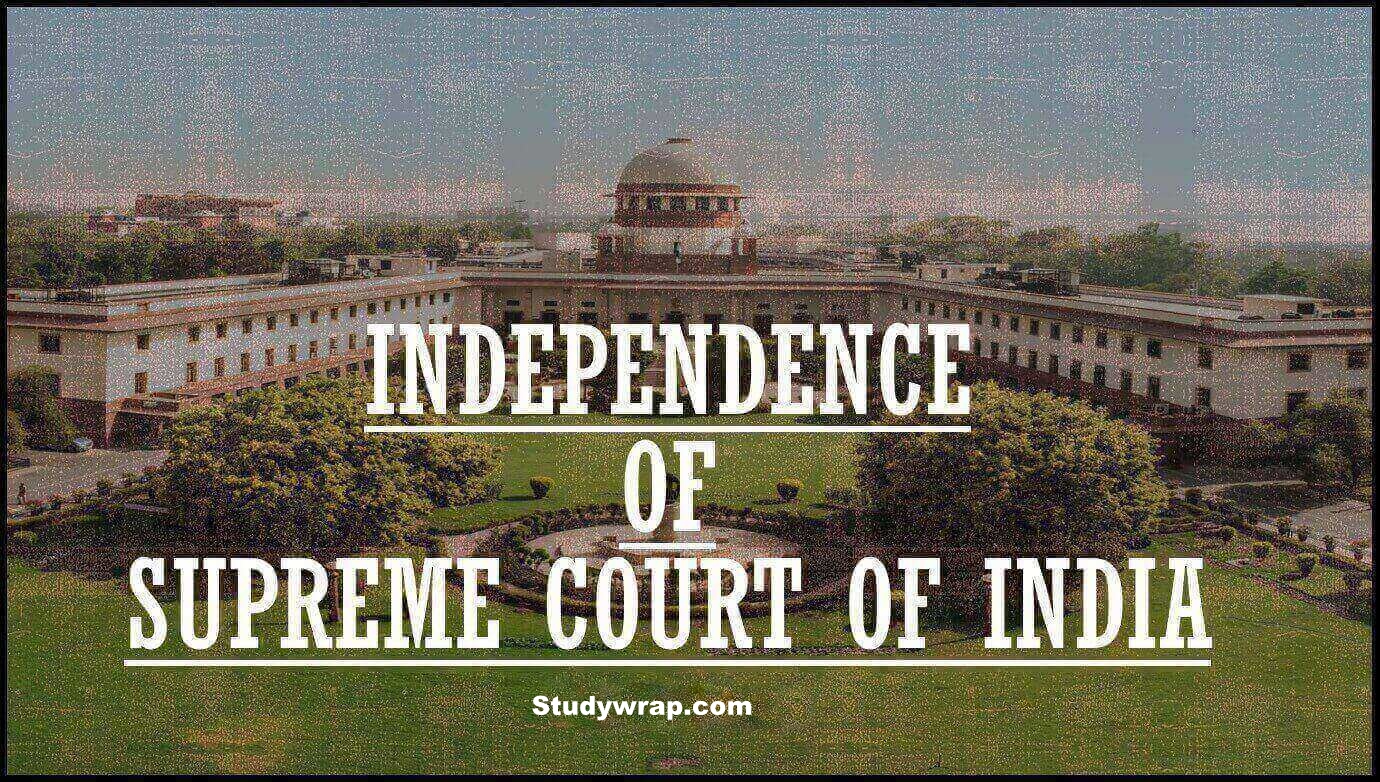Independence of Supreme Court of India
The Supreme Court of India
(Article 124 to 127 in Part V of Indian Constitution)
Independence of Supreme Court of India
· The Supreme Court has been assigned a significant role which can be seen as –
a. It is a federal court.
b. The highest court of appeal.
c. The Guarantor of Fundamental Rights.
d. Guardians of the Constitution

· Hence, the Independence of Supreme Court of India is of Prime importance to convey its duties.
· It should be free from pressure, interference and influence of the Executives and Legislatives.
· To make this happen, Constitution of India has made certain provisions which helps in safeguarding the independent and impartial functioning of Supreme Court.
· These are –
a) Mode of Appointment of Judges
· The judges of the Supreme Court are appointed by the President in consultation with the members of the judiciary itself (i.e., judges of the Supreme Court and the high courts).
· This ensures that the judicial appointment are not based on any political or practical consideration.
b) Security of Tenure
· Judges are provided with security of Tenure.
· They can be removed by the President only in the manner and grounds mentioned in Constitution.
· This means that they do not hold their office during the pleasure of the President, although they are appointed by him.
c) Fixed Service Conditions
· Salaries, allowances, privileges, leave and pension of the judges of the Supreme Court are determined by the Parliament.
· They cannot be changed to their disadvantage after their appointment except during a financial emergency.
d) Expenses Charged on Consolidated Fund
· The salaries, allowances and pensions of the judges and the staff along with all the administrative expenses of the Supreme Court are charged on the Consolidated Fund of India.
· Thus, it is non-votable by the Parliament.
e) Power to Punish for its Contempt
· Supreme Court can punish any person for its contempt to maintain its authority, dignity and honour.
· Its actions and decisions cannot be criticised and opposed by anyone.
f) Ban on Practice after Retirement
· The retired Judges of the Supreme Court are prohibited from pleading or acting in any Court or before any authority within the territory of India.
g) Jurisdiction cannot be curtailed
· Parliament cannot curtail the Jurisdiction and Powers of the Supreme Court. Though, it can extend the Jurisdiction.
· The Constitution has guaranteed to the Supreme Court, jurisdiction of various kinds.
h) Separation from Executive
· The Criminal Procedure Code (1973) has effected the separation of Judiciary from the Executive. (Article 50)
· This means that the executive authorities should not possess the judicial powers.
i) Conduct of Judges cannot be discussed
· The Constitution prohibits any discussion in Parliament or in any state legislature with respect to conduct of the Judges of the Supreme Court while discharging their duties except in case of Impeachment.
Difference between Indian and American Supreme Courts
|
|
Indian Supreme Court |
American Supreme Court |
|
Original Jurisdiction |
Confined to federal cases. |
Covers not only federal cases but also cases relating to naval forces, maritime activities, etc. |
|
Appellate Jurisdiction |
Covers constitutional, civil and criminal cases. |
Confined to constitutional cases only. |
|
Advisory Jurisdiction |
yes |
no |
|
Judicial Review |
Scope is limited |
Scope is very wide |
|
Rights To Citizen |
Defends according to the ‘Procedure established by Law’ |
Defends according to the ‘Due Process of Law’. |
|
Jurisdiction And Power |
Can be enlarged by the Parliament. |
Limited to that conferred by the Constitution. |
|
Judicial Superintendence |
It has power of judicial superintendence and control over state high courts due to integrated judicial system. |
It has no such power due to double (or separated) judicial system. |
So, this was all about the Independence of the Supreme Court of India and Difference between American and Indian Supreme Court.
In the Next Post (Click Here), we will study about the jurisdiction and powers of Supreme Court. If you have liked our Notes, do follow us on Facebook to get regular updates.

